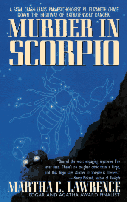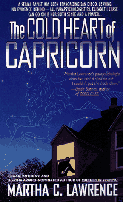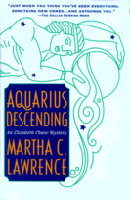A Conversation With Martha C. Lawrence
by Claire E. White
Martha C. Lawrence is the author of the award-nominated astrological mystery series featuring Dr. Elizabeth Chase,

|
Martha spoke with us about the psychic experiences which helped inspire her popular mystery series, and discusses Aquarius Descending, a fascinating book in which Elizabeth Chase goes undercover to expose an insidious cult.
You have said that your books are based on your own psychic experiences. Would you elaborate? Have you always had some psychic abilities?
I've been psychic for as long as I can remember. It took me some time to be open about it, because the term carries a stigma. You say "psychic" and people conjure up ludicrous images of psychic hotlines, fortune teller scam artists, neon palms hanging over store fronts in the run-down part of town. I don't blame them--I do the same thing. That's our current cultural bias. The fact remains that from the time I was small, I've seen auras and ghosts; I've dreamed in precise detail about things that later came to pass (my mother's near-fatal car accident, for one). Psychic ability runs in my family. I wouldn't be here today if my mom hadn't refused to let our family board a plane to Jamaica that she "knew" was going to crash. It did, killing everyone on board.
Did you really have a ghost in your house when you were growing up? What was that like?
Yes, I really grew up with a ghost. When I was little my parents assured me that the presence I felt was a figment of my overactive imagination. I took them at their word. Parents know best, right? I stopped talking about the ghost but didn't stop feeling it and secretly believed that I was insane. Finally I moved away to college and lived in a non-haunted house, which gave me a reference point. When I came home for the summer I knew that this presence I sensed was no figment of my imagination. One evening the ghost appeared to me--a beautiful blonde with a 1920s flapper haircut and the biggest, most horrified eyes I'd ever seen. After that the ghost wouldn't leave me alone. I had to leave the house until a ghost buster (for lack of a better term) came and took care of the problem. Years later, a title search of the property revealed that in the 1920s it was owned by a brother and sister who lost all their money in the market crash of 1929. According to official death reports, the early owners committed double suicide. Given how frightened that ghost looked, I have my doubts that she died voluntarily.
I understand your house was near the site where later the Heaven's Gate mass suicide occurred. Did you ever sense anything evil from that place? How does that area "feel" now?
If you stand on the terrace of my childhood (haunted) home, you look over at the Heaven's Gate mansion. The mansion wasn't built until fairly recently. As a kid I used to ride my horse on that hill in the moonlight. It was eerie, but then everything about that little neck of the woods in Rancho Santa Fe is eerie. A psychic reader once told me--long before Heaven's Gate--that I grew up in "an evil vortex." (Great, huh?) I drove up to the Heaven's Gate mansion shortly after the mass suicide and the energy was so thick and close that I almost vomited. These days the place simply has a disconnected feeling.
It seems like the world of psychics is fraught with frauds and impostors. How can you tell if someone is the real thing?
"By their fruits ye shall know them." In other words, if a psychic's insights prove over time to be accurate and helpful, they're probably the real thing. Still, I've known very gifted psychics--people who could read with amazing accuracy--who weren't particularly honorable people. It's like any other business. Get a reference from someone you know and respect. Ask yourself, "Does this person pass my gut feeling test?" If you have hesitations on a gut level, take a pass.
What is the most common misconception people have about psychic ability?
The most common misconception is that a psychic has superhuman powers. This myth has been promulgated by the media and false advertising. Not all psychics have the same level or types of abilities and no one is infallible. As in any other profession, psychics have good days and bad days.
Do you think a minimal psychic ability can be trained or enhanced?
To some extent. As with any activity, what you focus on will be enhanced. Working the mind is similar to working the body. You can't expect to develop an amazing physique with just six weeks of exercise. Training must become a lifestyle. So it is with psychic ability. Meditation and dream journaling will boost anyone's sensitivity over time. I believe everyone has far more psychic power than they realize. However, the extreme psychic experiences--precognitive dreams, encounters with light beings, etc.--are rare, even for so-called gifted psychics like me. Still, those everyday psychic insights can really enrich your life.
When did you first know you wanted to be a writer? Do you feel your family encouraged you to write?

|
What did you like most about living in New York City? Do you ever miss the East Coast?
At the risk of sounding woo-woo, the thing I love most about New York City is the energy. The view from a midtown skyscraper; all those people; all that art, culture, history. It's so incredibly stimulating--the psychic equivalent of an orgasm. Yes, I do miss the East Coast, especially since I have so many good friends there. Fortunately, as an author I get to go back every year or so.
How did you get interested in astrology? Do you still do readings?
One day I heard an astrologer, Farley Mallorus, on a radio program in Los Angeles and an inner voice said, "You're going to study with him." I had only a passing interest in astrology at the time. A few weeks later I encountered Farley Mallorus in a bookstore. He took one look at me and said, "Oh--I think you're the one who's supposed to study with me." So he became one of my early teachers. I used to read charts professionally but no longer take clients because my writing schedule doesn't permit it. Every now and then I donate a chart reading to a charitable cause.
What led up to your first novel being published?
A traumatic experience finally got me past my fear of writing. I was being stalked by a former boyfriend who broke into my house and began to strangle me. I think that's when it hit me that I might not be on Earth forever and that if I wanted to write books, I'd better get to it. I wrote Murder in Scorpio in 1993-94, during the stalking and subsequent criminal trial. (That I could do this amazed the district attorney and looking back, it amazes me, too.) I was one of the lucky ones--my stalker was jailed and my first novel was picked up by a publisher right away.
How did you create Elizabeth Chase? She has such a distinctive "voice."
I'd been knocking around the idea of writing a first-person PI novel for some time. I loved Sherlock Holmes as a kid, and wanted to create a character who did for the right brain what Holmes had done for the left brain. In other words, Holmes had championed the art of deductive reasoning, and I wanted to champion the art of intuitive reasoning. Sometimes I think I channel Elizabeth. I hated her name--that "Chase" part especially, which sounded too WASP-y to me. When I tried to come up with a list of alternate names she typed back, "My name is Elizabeth Chase!" That line appears in the prologue of Murder in Scorpio.
The second Elizabeth Chase book, The Cold Heart of Capricorn, deals with a very serious subject -- a serial rapist and the complex after effects of severe trauma on different types of people. Was this a difficult book for you to write personally? Did writing the book help you in any way?

|
I'd like to talk about your latest book, Aquarius Descending. What was the inspiration for this story?

|
The book has a lot of detail about how the inside of a cult really works -- especially the enticement of new members. How did you research this book?
Just like Elizabeth does in Aquarius Descending, I went undercover into a number of groups that I consider to be cults. Although the cult in my book is a hybrid of my own creation, the processes and techniques it uses are common to most cults. One reader commented that he couldn't believe a cult could have the far-ranging powers I show in my book. If anything, I toned the cult powers down. Truth is stranger than fiction, here more than ever.
What's in Elizabeth Chase's future -- can you give us a sneak peek?
In Elizabeth's next adventure, Pisces Rising, she's asked to investigate a murder at a gambling casino on an Indian reservation near San Diego, California. During the course of the investigation Elizabeth hooks up with a Native American shaman, who teaches her new ways to use her psychic ability.
How have your experiences as an editor affected your own writing?
All those years as an editor have left me with a constant, nagging voice that keeps asking, "Does it forward the plot? If not, out with it!" This can make for some very short first drafts. I'm sure that my editing experience helps in the long run, but during the creativity phase it can be a handicap.
What did you enjoy most about working in the book publishing industry?
You mean beyond being paid to satisfy my reading addiction? Without question the best moments were making those phone calls to agents and saying, "I'd like to make an offer on. . . ." Seeing a book that you've nurtured from first draft make it to the bestseller list is pure joy. I loved working with the authors the most.
What was the most difficult part of working in book publishing?
| "I get lots of letters from people who share their own psychic experiences. Many readers say they're complete skeptics, but they love my books. I cherish those." |
Let's talk a little about the everyday aspects of writing -- what is your writing schedule like?
Depends on where I am in a book. Most days I hit the computer by eight or nine in the morning and either research/outline (beginning phase), write (middle phase) or panic (deadline phase). I break in the afternoon to exercise and run errands and write again at night, when I tend to be most inspired. Sue Grafton told me last month that she only writes for two hours in the morning, but I think she's lying.
How much interaction do you have with your readers? What has the feedback been like from fans?
Compared to Mary Higgins Clark, I'm sure I have moderate interaction with readers, but sometimes it feels overwhelming. Now that more people are online it's easier to stay on top of my correspondence. It's always an honor to hear from a reader. To date no one has written to tell me I'm a crackpot, which surprises me. On the contrary, I get lots of letters from people who share their own psychic experiences. Many readers say they're complete skeptics, but they love my books. I cherish those.
Who are some of your favorite authors?
| "I believe everyone has far more psychic power than they realize. However, the extreme psychic experiences--precognitive dreams, encounters with light beings, etc.--are rare, even for so-called gifted psychics like me. Still, those everyday psychic insights can really enrich your life." |
What are some of your favorite ways to relax?
You'd think after twenty years doing this professionally I'd want to do something else, but to me "relaxation" means reading a good book. Yoga is another way I love to relax--sometimes while doing the plow position, I feel like I'm in out-of-body bliss (come to think of it, I probably am). I also love gardening, snorkeling, watching movies, and hanging out with my wonderfully talented, loving friends. These days I do indeed live a charmed life.
Return to the May 1999 issue of The IWJ.
More from Writers Write
